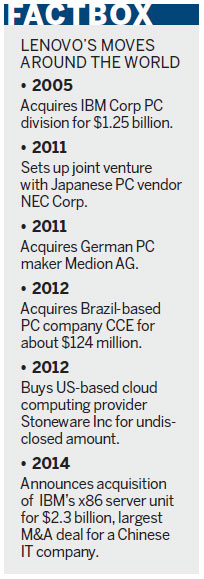

Lenovo Group Ltd's purchase of the Motorola Mobility business, a money-losing subsidiary owned by Google Inc, will give the Chinese company advantages in exploring the global tablet and smartphone markets, analysts said.
The comments came after Lenovo said that it will announce a "major acquisition deal" on Thursday.
The deal, worth at least $2 billion, will include a large volume of mobile communications patents currently held by the US company, a person familiar with the matter told China Daily.
Lenovo declined to comment on Wednesday, saying only that details would be disclosed the following day.
The deal comes just one week after the Beijing-based company said it would buy IBM Corp's x86 server unit for $2.3 billion.
Shares of Lenovo rose 4.6 percent in Hong Kong to HK$10.96 ($1.40) on Wednesday, the highest level since mid-2000.
"Motorola will enable Lenovo to close the gap between Apple Inc and Samsung Electronics Co in the mobile intelligent devices sector," said Antonio Wang, associate director and project leader for IDC China's client system research department.
"The acquisition will help Lenovo clinch the position as the third-largest smartphone vendor worldwide," Wang added.
Lenovo could make good use of Motorola's patent rights when exploring overseas markets. Motorola is the biggest holder of mobile communication patents, according to IDC.
Motorola has about 17,000 patents, a valuable resource for an emerging brand to explore developed markets, said Wang.

Google, which also owns the popular smartphone operating system Android, acquired Motorola Mobility in 2011, spending about $12.5 billion.
Analysts said that Google needed Motorola to expand Android's popularity two years ago, but as Android has become the No 1 operating system in the global market, there's no reason to keep a unit that is bleeding money.
The segment reported a $248 million operating loss during the third quarter of 2013, according to Google's financial report.
"Google has lost roughly $1 billion on Motorola in terms of operating losses since 2011, so selling the unit is a wise decision," said Wang, adding that it was also wise for Lenovo to take over Motorola because the price was low and Lenovo is capable of making the unit profitable again.
In 2005, Lenovo bought IBM's PC business and used it to help it become the world's top producer of PCs.
The company hopes acquisitions can yield similar results in the enterprise server and consumer electronics segments.
Yang Yuanqing, chairman and CEO of Lenovo, told China Daily in October that mergers and acquisitions are useful for Lenovo to gain market share quickly and explore new markets.
"The pending acquisition of IBM's server unit will elevate Lenovo beyond a PC and smartphone company to become a serious global player in enterprise infrastructure," said Nicole Peng, research director at Canalys China, a Shanghai-based consultancy.
"Acquiring a global smartphone company is the last piece of the jigsaw puzzle, allowing Lenovo to complete its offering in both the consumer and enterprise markets as an international company," she said.
Since mid-2013, Lenovo's smartphones and tablets have been making progress in a number of overseas markets, including Russia, the Philippines and Indonesia. It also recently expanded to Latin America.
On Tuesday, Lenovo said it will reorganize its corporate structure into four groups: PCs, mobile devices, enterprise businesses and cloud services.
The structure will make it easier for Lenovo to integrate future new brands in each product business unit.
gaoyuan@chinadaily.com.cn